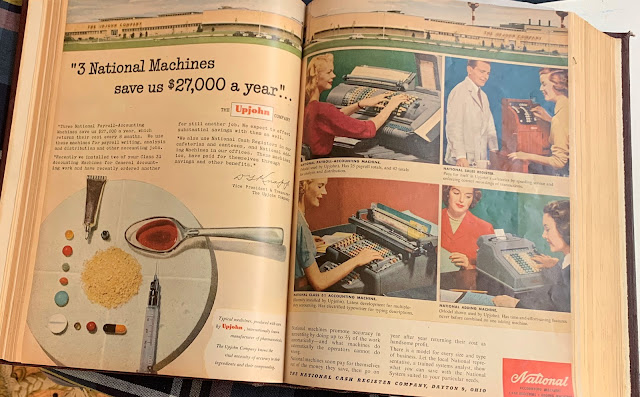The Mayflower,
Washington, D.C.
 |
Your Loving (if exasperated!) Daughter,
Ronnie
Bench Grass is a blog about the history of technology by the former student of a student of Lynn White. The main focus is a month-by-month retrospective series, covering the technology news, broadly construed, of seventy years ago, framed by fictional narrators. The author is Erik Lund, an "independent scholar" in Vancouver, British Columbia. Last post will be 24 July 2039.
 |
Nine years ago, so in 2014, some vaguely professional media people up in Nebraska decided that these six young people had something going on, and arranged some venues leading to six (I think?) videos, most with at least slightly wonky sound. No-one watched them, and teenagers grow up quickly, so I assume that these kids quit music, joined a space mission, were exposed to cosmic radiation, gained superpowers, and now fight crime. Or something.
Probably not that, actually. Anyway, point is, the Youtube algorithm proceeded to sit on these videos for eight years while all this was going on before suddenly pushing it into everyone's feeds, leading to 200,000 views and 2000 upvotes in the last year or so. This being a lot, but not, as the kids say, not a lot of a lot, it's possible that no-one involved in making these videos knows that they have been picking up views. It's algorithm archaeology! Also, it's me sharing a video that I enjoyed. (Speaking of which, I speed read through Martha Wells' Murderbot Diaries this week. Its good!)Also some more, Sidestone Press, has launched a new initiative where you can read their books for free online. Like, for example, Lorenzo Zamboni, Manuel Fernandez-Goetz, and Carola Metzner-Nebelsick, Crossing the Alps: Early Urbanism between Northern Italy and Central Europe (900--400BC (Sidestone, 2020)! It's got the latest from the Heuneburg excavations, so I'm not going to argue about the financial viability of their business model, even if I'm pretty sure that "giving stuff away for free" does not work.
 |
| Caroline Geoghegan |
So, three things: i) There is no way that I am not posting this ad, especially the week I read Edith Outland on "the Effingham libels." Man, did Horace Greeley know how to stick in the knife! ii) I'm off on a bonus week of vacation to see my Mom, so I'm looking for a blog post that requires more wandering-around-the-Intenet-at-the-kitchen-table than blasting away at the keyboard whilst surrounded by ancient tomes. iii) Lameen has confirmed that "there was no North African Bronze Age" is something people say.
I have academic confirmation of the commonplace that makes it a bit less bizarre, but there is a deeper problem in that there seems to be a lack of communication between research silos. Something isn' t right in the prehistory of the Maghreb.

 |
These do include plenty of typewriter ads, but none as female-centric or as eyecatching as the long series of ads for NCR's accounting machines. The semiotics of the ads vary from all female casts showing off the machine's features to bosses overlooking the operator who can be read as either admiring or patronising --me not being smart enough at that whole "deconstruction" thing to tell the difference-- and this one, which has four vignettes for the price of one. The one male is the white-coated technician, either advising or receiving operator feedback; and so this is the one I went with.
All of this raises the question which has been implicit all along, but which I just twigged to the other day: What about the electric typewriter? We've been hearing a great deal from the frontiers of aviation about the adoption of powered controls, but here is a very old frontier in automation and disintermediation. How did the manual operation of a 120wpm typewriter turn into the operation of an electric appliance at 10 discrete, controlled operations a second? What's the story?